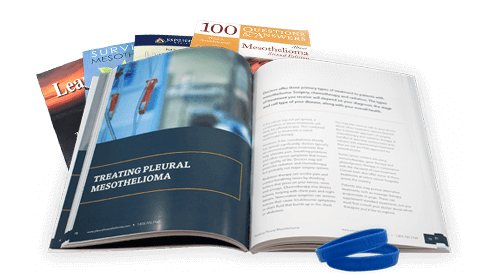Keytruda and Mesothelioma
Keytruda is a popular immunotherapy medication recently approved by the FDA to treat mesothelioma. Immunotherapy uses the body’s immune system to find and kill cancer cells. Most patients experience mild side effects, and research is ongoing to discover effective combinations with other treatments.
Keytruda Gains FDA Approval to Treat Mesothelioma
Pembrolizumab, which also goes by the brand name Keytruda, is one of the most well-known immunotherapy treatment options for cancer patients. In June 2020, the U.S. Food and Drug Administration approved Keytruda for use in select solid tumor cancers, including mesothelioma.
The FDA approval specifies that doctors should prescribe Keytruda for metastatic patients with no alternative treatment options. Metastasis means cancer has spread within the body, and the patient is no longer eligible for surgery. For mesothelioma patients, doctors prescribe Keytruda as second-line therapy after initial treatment has failed.
Results from the KEYNOTE-158 clinical trial led to the FDA’s decision to approve Keytruda. The trial concluded in 2019 and reported a progression-free survival rate of 14.1% in most mesothelioma participants. Survival rates were even higher for patients who expressed high PD-L1 protein levels, about 20% of mesothelioma patients.
What’s Next for Keytruda and Mesothelioma?
The next steps for Keytruda use will involve decreasing the therapy’s side effects and increasing its effectiveness. Researchers are continuing to look for new ways of combining Keytruda with other mesothelioma treatment options to maximize results.
Mesothelioma clinical trials with Keytruda will continue while researchers identify the best ways to combine the immunotherapy with other treatments. Dr. Uri Weinberg, co-creator of Tumor Treating Fields therapy for mesothelioma, launched the LUNAR study to examine its effects when used with Keytruda.
“This study takes into account the very encouraging preclinical results we have seen in animal models,” said Weinberg. “It demonstrates that TTFields could actually increase the level of inflammation and response of the immune system against the tumor cells when combined with immune checkpoint inhibitors [like Keytruda].”
How Does Keytruda Treat Mesothelioma?
Because Keytruda is an immunotherapy medication, it activates the patient’s immune system to identify and destroy cancer cells. Keytruda allows immune cells, such as T-cells, to attack tumors like a bacterial or viral infection.
Keytruda is part of a class of medications called immune checkpoint inhibitors. This class includes nivolumab (Opdivo) and ipilimumab (Yervoy), which also have FDA-approval to treat mesothelioma. These drugs remove the immune system checkpoints or barriers that cancer uses to hide from immune cells.
Some types of cancer, including malignant mesothelioma, hide from the immune system in the PD-1 pathway. Your body uses the PD-1 checkpoint to make sure it isn’t attacking normal healthy cells.
Keytruda deactivates the PD-L1 protein from cancer cells, the portion that allows them to appear like healthy cells in the PD-1 pathway. This deactivation lets T-cells, a type of white blood cell, attack the unmasked and exposed tumor.

Benefits of Keytruda
Pembrolizumab has a long history of effectiveness. Doctors have been using it since 2017 as a first-line treatment option for non-small cell lung cancer patients. The medication doubled their five-year survival rate versus chemotherapy alone. Former U.S. President Jimmy Carter credited Keytruda for his survival after announcing he was cancer-free from melanoma in 2015.
One of Keytruda’s primary benefits is a reduced incidence of significant side effects over traditional mesothelioma chemotherapy. Immunotherapy drugs rely on the patient’s immune system, so many adverse effects are mild inflammation reactions, such as fever or rash.
Due to its low toxicity, Keytruda is a prime candidate for multimodal therapy. Clinical trials are ongoing to test the effectiveness of Keytruda when combined with other treatments, such as Tumor Treating Fields for mesothelioma.
Patients who have cancer with a high PD-L1 expression tend to benefit more from the treatment. Roughly one in five mesothelioma patients have levels of the PD-L1 biomarker high enough for Keytruda to be effective.
Progression-free survival is higher for patients with a high tumor mutational burden of PD-L1. About 26.4% of these mesothelioma patients survive for one year without disease progression after treatment with Keytruda.
Survivor Experiences with Keytruda
Pleural mesothelioma survivor Walter Merth believes Keytruda gave him a second chance.
“I’m getting stronger every day,” Merth said. “This therapy has given me a new window. It may not save my life, but it’s certainly buying me some valuable time.”
After his diagnosis in 2016, pleural mesothelioma survivor Ron Green enrolled in a Keytruda clinical trial.
“I started Keytruda, and almost immediately things changed for the better,” he said. “You could feel it. Something worked for me.”
Eligibility for Keytruda Treatment
The FDA has approved Keytruda as a second-line treatment for patients who meet all of the following indications:
- Unresectable Disease: The patient is not a candidate for surgery.
- Metastatic Disease: The patient has late-stage or stage 4 cancer at distant sites.
- No Alternative Treatment Options: Disease has progressed after other treatments.
- High Tumor Mutational Burden: PD-L1 levels must be above 50%.
Patients who are eligible for Keytruda will receive a blood test to determine their levels of PD-L1 expression. This test helps inform the doctors whether Keytruda will be an effective treatment.
The FDA-recommended Keytruda dosage for mesothelioma patients that meet all criteria is 200 mg every three weeks or 400 mg every six weeks. Doctors continue the treatment until disease progression or up to 24 months if there are no signs of worsening disease.
Immunotherapy can affect patients differently and may not always be the correct option. Speaking with a mesothelioma specialist is the best way to find out if you are eligible for Keytruda. Experienced physicians will develop an individualized treatment plan based on your disease history, cancer type and mesothelioma stage.
Side Effects of Keytruda
Keytruda side effects are common among patients on immunotherapy. However, they are usually mild. About 24% of Keytruda patients report nausea and tiredness, the most common side effects of the drug. Most side effects of mesothelioma immunotherapy are tolerable and resolve on their own or with medication.
Common Keytruda and immunotherapy side effects include:
- Fever
- Rash
- Itching
- Fatigue
- Nausea
- Diarrhea
- Constipation
- Loss of appetite
- Joint or muscle pain
- Dry mouth
- Cough
- Shortness of breath
- Decreased red blood cells (anemia)
Many of Keytruda’s side effects are due to swelling and irritation from the immune system. This inflammation reaction can also affect sensitive organs, causing more serious adverse effects.
Complications of immunotherapy are rare but can include organ dysfunction in the kidneys, lungs, liver, intestines and hormonal glands. In the lungs, prolonged inflammation may lead to pneumonia. Signs of severe reactions may include chest pain, abdominal pain, increased heart rate, intestinal or urinary issues and low back pain.
Any medication given through a vein can also cause adverse IV reactions. These include itching, rash, fever or shortness of breath. Patients interested in Keytruda should be aware of all possible side effects and alert their doctor immediately if they experience any symptoms. For mesothelioma patients, the potential benefits often outweigh the risks.



